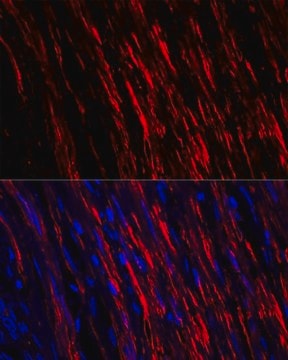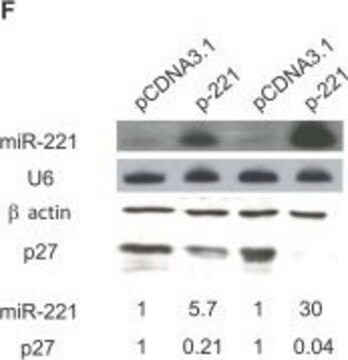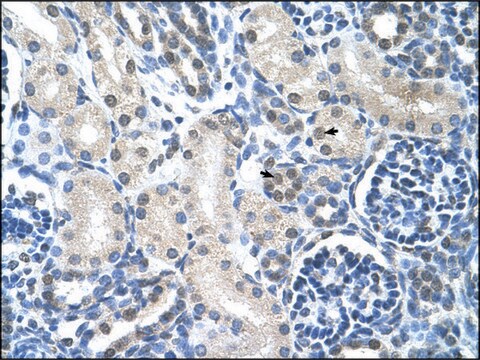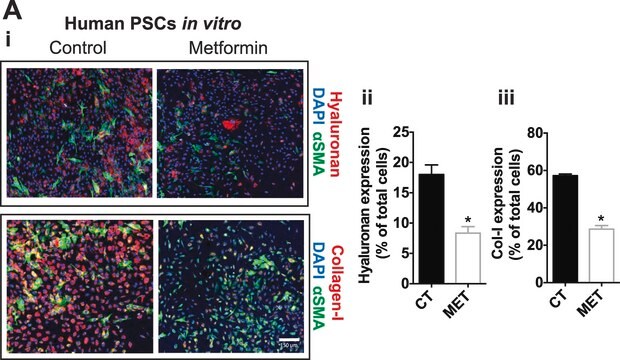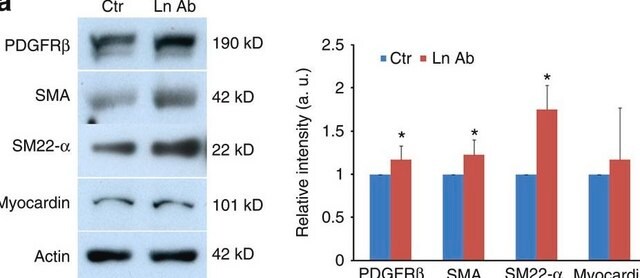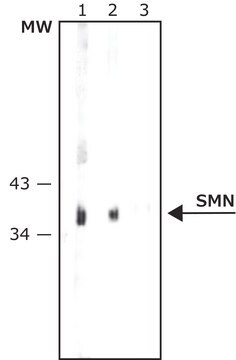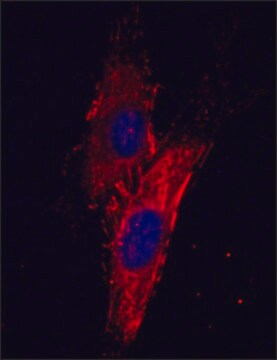SAB5500002
Anti-SMA antibody, Rabbit monoclonal
clone SP171, recombinant, expressed in proprietary host, affinity isolated antibody
Faça loginpara ver os preços organizacionais e de contrato
About This Item
Código UNSPSC:
12352203
NACRES:
NA.41
Produtos recomendados
fonte biológica
rabbit
Nível de qualidade
recombinante
expressed in proprietary host
conjugado
unconjugated
forma do anticorpo
affinity isolated antibody
tipo de produto de anticorpo
primary antibodies
clone
SP171, monoclonal
reatividade de espécies
human (tested)
reatividade da espécie (prevista por homologia)
rabbit, rat, bovine, chicken, mouse, pig
técnica(s)
immunoblotting: 1:50
immunohistochemistry: 1:200
Isotipo
IgG
nº de adesão UniProt
Condições de expedição
wet ice
temperatura de armazenamento
2-8°C
modificação pós-traducional do alvo
unmodified
Informações sobre genes
human ... ACTA2(59)
Descrição geral
Smooth muscle actin-α (SMA), also known as α2-smooth muscle actin (ACTA2), is a cytoskeleton protein in smooth muscle cells. It is encoded by the gene mapped to human chromosome 10q23.31. SMA is a vascular smooth muscle specific isoform,
Smooth muscle actin-alpha (SMA) is a cytoskeleton protein in smooth muscle cells and their derived tumors such as leiomyoma and leiomyosarcoma. It is also expressed in myoepithelial cells of the breast and salivary gland, but not in fibroblasts, striated muscle, and myocardium.
Imunogênio
Synthetic peptide near the N-terminus of human SMA protein.
Aplicação
Anti-SMA antibody, Rabbit monoclonal has been used in:
- western blotting
- immunohistochemistry
- immunofluorescence
Ações bioquímicas/fisiológicas
Smooth muscle actin-α (SMA)/ α2-smooth muscle actin (ACTA2) interacts with β-myosin heavy chain and facilitates vascular smooth muscle cell contraction. The encoded protein regulates c-MET (tyrosine-protein kinase Met) and focal adhesion kinase (FAK) expression in human lung adenocarcinoma cells, which positively and selectively mediates tumor progression. Thus, SMA can be used as a potential prognostic biomarker and/or target for treating metastatic lung adenocarcinoma. Mutation in the gene is associated with the development of patent ductus arteriosus (PDA), bicuspid aortic valve (BAV), iris flocculi, livedo reticularis, cerebrovascular accident (CVA) and stenosis of the aortic vasa vasorum. In addition, variation in the gene expression leads to thoracic aortic aneurysms and dissections (TAAD).
Características e benefícios
Evaluate our antibodies with complete peace of mind. If the antibody does not perform in your application, we will issue a full credit or replacement antibody. Learn more.
forma física
0.1 ml rabbit monoclonal antibody purified by protein A/G in PBS/1% BSA buffer pH 7.6 with less than 0.1% sodium azide.
Exoneração de responsabilidade
Unless otherwise stated in our catalog or other company documentation accompanying the product(s), our products are intended for research use only and are not to be used for any other purpose, which includes but is not limited to, unauthorized commercial uses, in vitro diagnostic uses, ex vivo or in vivo therapeutic uses or any type of consumption or application to humans or animals.
Não está encontrando o produto certo?
Experimente o nosso Ferramenta de seleção de produtos.
Código de classe de armazenamento
10 - Combustible liquids
Classe de risco de água (WGK)
WGK 2
Ponto de fulgor (°F)
Not applicable
Ponto de fulgor (°C)
Not applicable
Escolha uma das versões mais recentes:
Já possui este produto?
Encontre a documentação dos produtos que você adquiriu recentemente na biblioteca de documentos.
Os clientes também visualizaram
Epithelial-to-mesenchymal transition confers pericyte properties on cancer cells.
Shenoy A K, et al.
The Journal of Clinical Investigation, 126(11), 4174-4186 (2016)
Xia Ke et al.
The Journal of allergy and clinical immunology, 143(4), 1560-1574 (2018-09-09)
Numbers of mesenchymal stem cells (MSCs) are increased in the airways after allergen challenge. Ras homolog family member A (RhoA)/Rho-associated protein kinase 1 (ROCK) signaling is critical in determining the lineage fate of MSCs in tissue repair/remodeling. We sought to investigate
Ying-Chun Zhu et al.
International journal of molecular medicine, 40(4), 1165-1171 (2017-08-30)
Transforming growth factor-β (TGF-β) induces epithelial-mesenchymal transition (EMT) primarily via a Smad‑dependent mechanism. However, there are few studies available on TGF-β-induced EMT through the activation of non‑canonical pathways. In this study, the Cdc42-interacting protein-4 (CIP4)/partitioning-defective protein 6 (Par6) pathway was investigated in TGF-β1‑stimulated NRK-52E cells. Rat
Suppression of CIP4/Par6 attenuates TGF-β1-induced epithelial-mesenchymal transition in NRK-52E cells.
Zhu Y-C, et al.
International Journal of Molecular Medicine, 40(4), 1165-1171 (2017)
The genetics and genomics of thoracic aortic disease.
Pomianowski P and John A E
Journal of Cardiothoracic Surgery, 2(3), 271-271 (2013)
Nossa equipe de cientistas tem experiência em todas as áreas de pesquisa, incluindo Life Sciences, ciência de materiais, síntese química, cromatografia, química analítica e muitas outras.
Entre em contato com a assistência técnica

